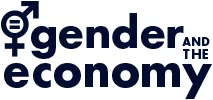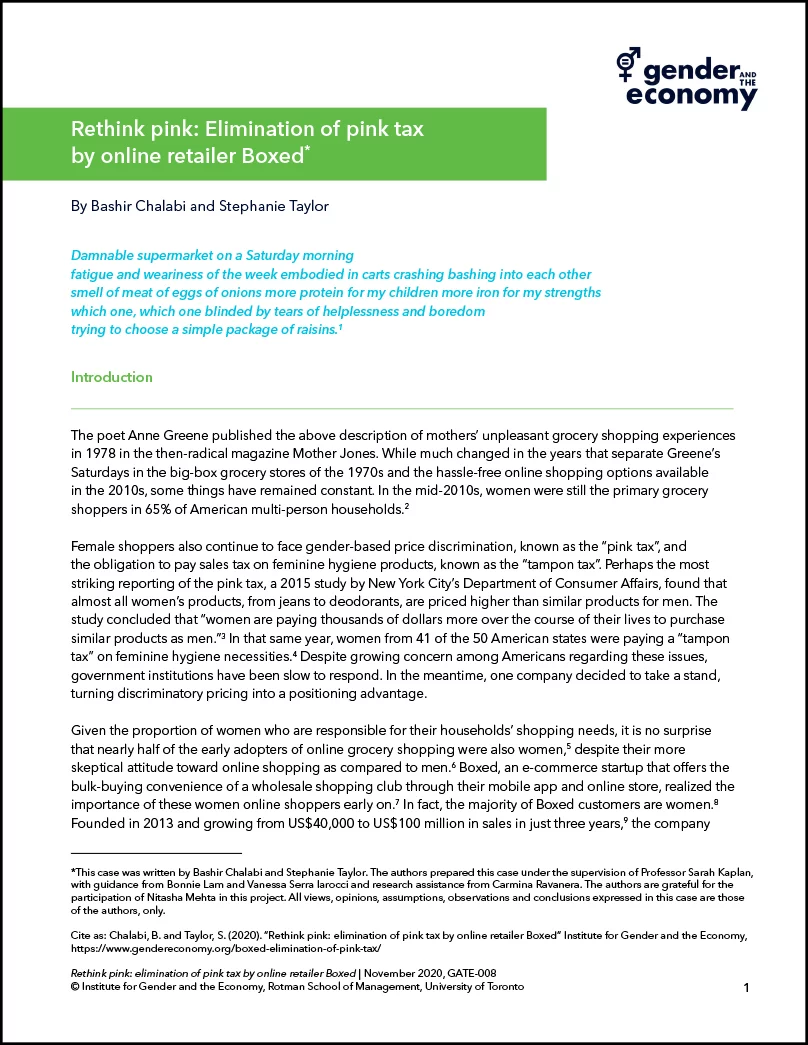Overview
This case study examines how e-commerce household goods startup Boxed leveraged the grassroots movement against gender-based price discrimination and taxation on feminine hygiene products by implementing its “Rethink Pink” program in 2016. In addition to addressing these issues by implementing gender-neutral pricing, the program also succeeded in gaining the trust and loyalty of women consumers.
Course Topics:
- Gender analysis
- Innovation
- Diversity and inclusion
- Corporate social responsibility
- Entrepreneurship
- Marketing
Introduction:
Female shoppers continue to face gender-based price discrimination, known as the “pink tax”, and the obligation to pay sales tax on feminine hygiene products, known as the “tampon tax”. Perhaps the most striking reporting of the pink tax, a 2015 study by New York City’s Department of Consumer Affairs, found that almost all women’s products, from jeans to deodorants, are priced higher than similar products for men. The study concluded that “women are paying thousands of dollars more over the course of their lives to purchase similar products as men.” In that same year, women from 41 of the 50 American states were paying a “tampon tax” on feminine hygiene necessities. Despite growing concern among Americans regarding these issues, government institutions have been slow to respond. In the meantime, one company decided to take a stand, turning discriminatory pricing into a positioning advantage.
Given the proportion of women who are responsible for their households’ shopping needs, it is no surprise that nearly half of the early adopters of online grocery shopping were also women, despite their more skeptical attitude toward online shopping as compared to men. Boxed, an e-commerce startup that offers the bulk-buying convenience of a wholesale shopping club through their mobile app and online store, realized the importance of these women online shoppers early on. In fact, the majority of Boxed customers are women. Founded in 2013 and growing from US$40,000 to US$100 million in sales in just three years, the company soon risked having to lower its profit margins to address growing price competition with other online retailers. In 2016 a long-discussed partnership between delivery service Instacart and wholesale giant Costco took off, and Walmart also launched online sales. In search of greater differentiation and a way to increase valuable female customer loyalty, Boxed, which had thus far marketed “easy shopping”, looked to a non-traditional avenue, implementing a women-focused initiative at the intersection of corporate social responsibility and marketing. Leveraging the grassroots movement against gender-based price discrimination and taxation on tampons, Boxed implemented its impactful “Rethink Pink” program in 2016, addressing both issues on behalf of their customers. Four years later, Boxed continues to highlight the program to ensure the loyalty of female online shoppers whose increasing numbers are accelerating more than ever in the midst of the 2020 global pandemic.
View and download the full case study
__________________________
This case was written by:
This case was written by Bashir Chalabi and Stephanie Taylor. The authors prepared this case under the supervision of Professor Sarah Kaplan, with guidance from Bonnie Lam and Vanessa Serra Iarocci and research assistance from Carmina Ravanera. The authors are grateful for the participation of Nitasha Mehta in this project.








